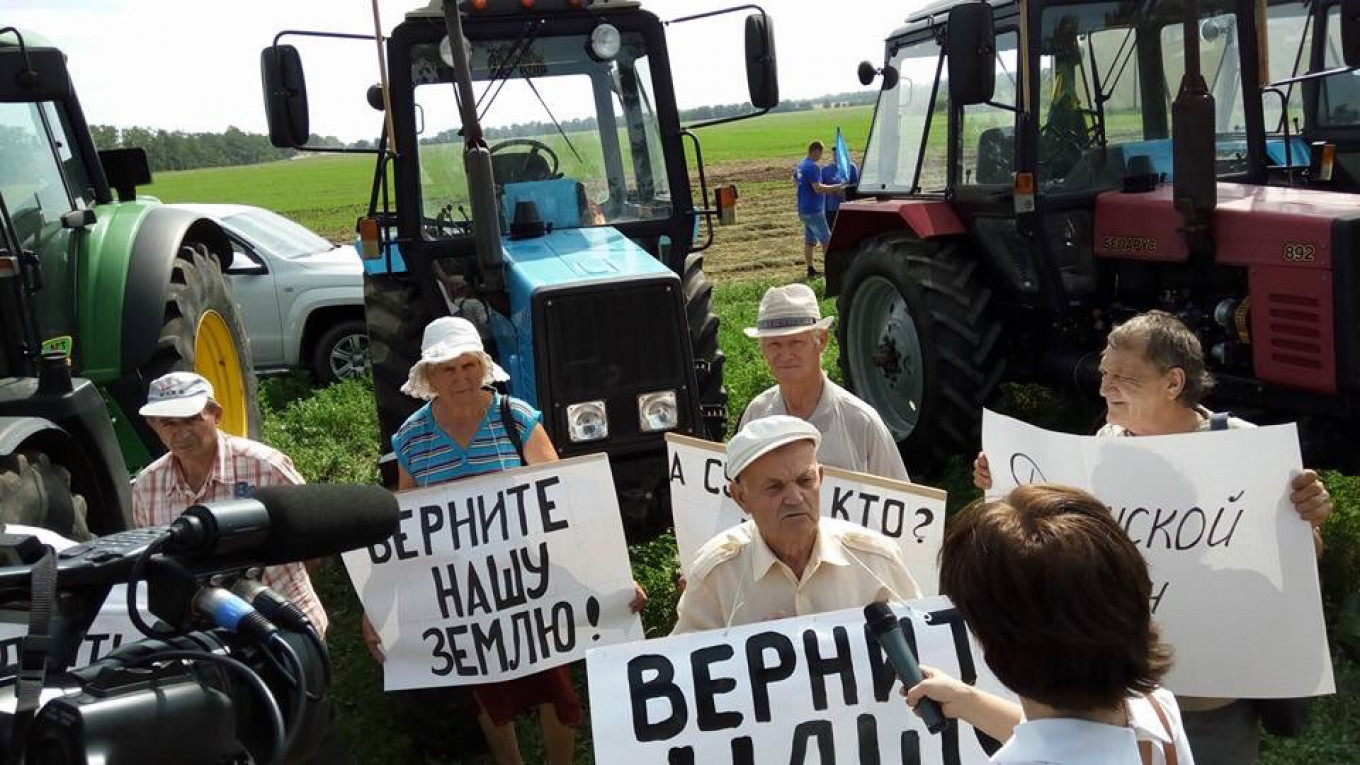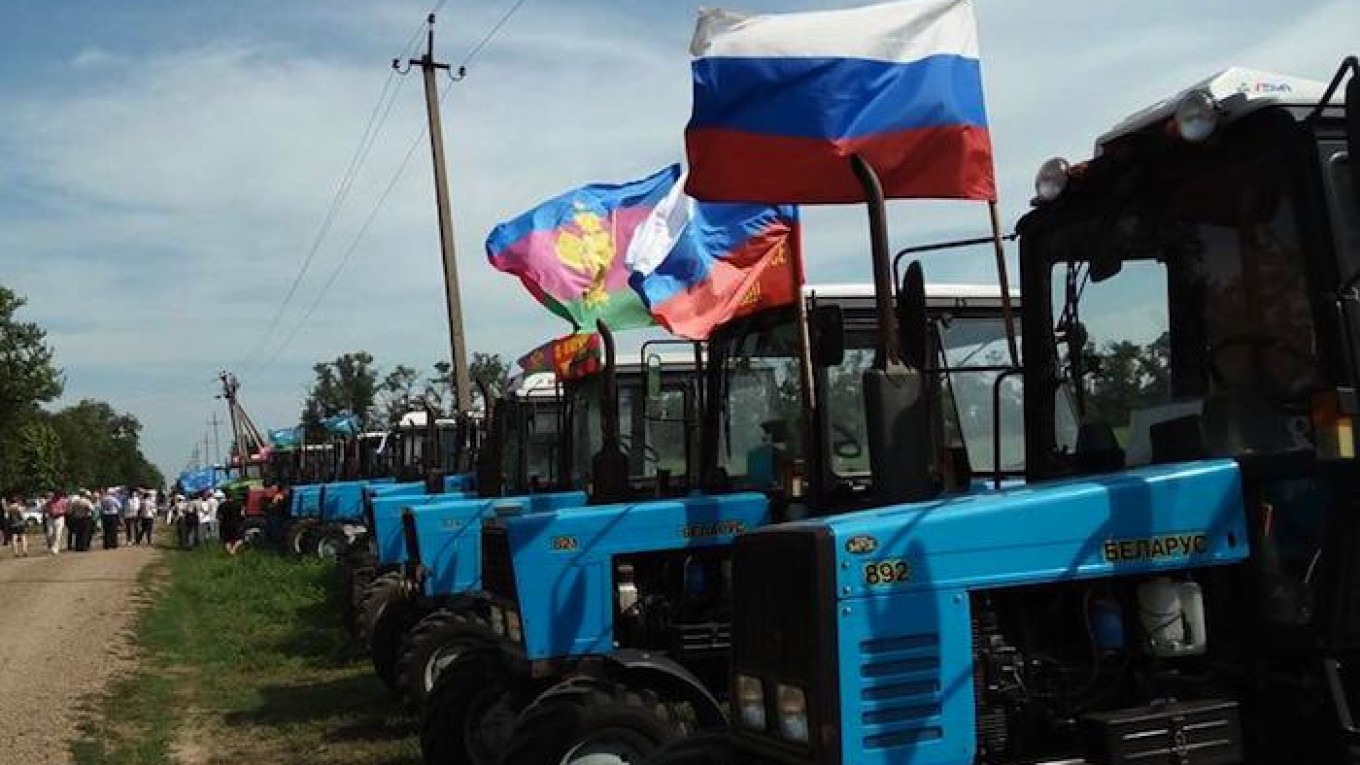Several hundred farmers from southern Russia complained of intense
police harassment Monday as they entered the second day of a drive towards
Moscow they are staging to raise awareness about the problem of local
corruption.
In the space of 24 hours, their convoy of tractors and cars was stopped 17 times by police and security service officers, Oleg Petrov, one of the farmers taking part, told The Moscow Times.
“We don’t know what to do. We want to go to Moscow but there has been so much police and FSB presence. It’s scary,” said Petrov.
The demonstration is a rare example of public dissent outside Russia’s large cities, and its form echoes widespread protests by lorry drivers earlier this year. Those truckers attempted to block the imposition of a controversial new lorry taxation system. Their tactics also included convoys that sought to block roads around the Russian capital.
The farmers have said they want to drive all the way to Moscow to meet with members of the government to air their grievances — a journey that would take another five or six days.
“The aim is to move the problem from a regional to a national level,” said Alexei Titkov, a political analyst at the Higher School of Economics in Moscow.

The protest comes during a sensitive political period as Russia prepares for Sept. 18 elections to the lower house of parliament, the State Duma.
Another protest organizer, Alexei Volchenko, told The Moscow Times by telephone Monday evening that the convoy had been blockaded by police vehicles and riot police just outside the southern Russian city of Rostov-on-Don.
“In essence we are now being held hostage,” said Volchenko, who added that the protest had been agreed in advance with the traffic police. By organizers’ estimates, about 200 people and 20 tractors were taking part in the protest.
The convoy began their journey Sunday after a rally in the Kavkazsky District of Russia’s southern Krasnodar Region. Placards at the demonstration included “Give Our Land Back.” Lorry drivers, active in protests earlier this year, also appeared to be present.
Organizer Volchenko said he became involved when his land was seized overnight and he had not been able to obtain its return via the courts. In his despair, he took to social media and managed to find other farmers with similar problems.
Plans by Volchenko and other activists to dispatch a tractor column to Moscow in March were cancelled at the last minute after an offer from the All-Russian People’s Front, a group loyal to President Vladimir Putin, to mediate the conflict.
“They promised to help solve all our problems but didn’t solve anything,” said Volchenko.
There has not yet been any reaction from officials, although activists said on Monday they were approached by a deputy of regional Presidential Envoy Vladimir Ustinov, who offered to act as a go-between the demonstrators and the government in Moscow. His overtures were rebuffed.
Some analysts said the farmers’ protest was rooted in the local politics of this area of southern Russia, known as the Kuban, where disputes over land have flared for years. Following the fall of the Soviet Union, each resident of the region was handed a small parcel of land as a part of the process of breaking up huge collective farms.
The Kuban is one of Russia’s most fertile grain producing regions, and farmers are coming to the end of harvesting a predicted bumper crop.
“These sorts of protests are often based on strong emotions or the work of active leaders who are ready to put themselves forward,” said Mikhail Vinogradov, an analyst who tracks regional politics with the Peterburgskaya Politika think tank.
The history of the lorry drivers would indicate that there is little chance of the farmers achieving their goals. Despite months of rolling protests, the Platon tax system, which was the chief grudge for the lorry drivers, was imposed nationwide earlier this year.
“The president and the government do not concede when they are presented with direct demands,” said analyst Titkov. “The farmers’ chances of success are not great.”
A Message from The Moscow Times:
Dear readers,
We are facing unprecedented challenges. Russia's Prosecutor General's Office has designated The Moscow Times as an "undesirable" organization, criminalizing our work and putting our staff at risk of prosecution. This follows our earlier unjust labeling as a "foreign agent."
These actions are direct attempts to silence independent journalism in Russia. The authorities claim our work "discredits the decisions of the Russian leadership." We see things differently: we strive to provide accurate, unbiased reporting on Russia.
We, the journalists of The Moscow Times, refuse to be silenced. But to continue our work, we need your help.
Your support, no matter how small, makes a world of difference. If you can, please support us monthly starting from just $2. It's quick to set up, and every contribution makes a significant impact.
By supporting The Moscow Times, you're defending open, independent journalism in the face of repression. Thank you for standing with us.
Remind me later.






